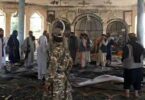F.P. Report
ISLAMABAD: The Pakistani nation was all set to elect public representatives for five-year democratic term on Thursday. The Election Commission of Pakistan (ECP) in coordination with various supporting departments, including law enforcement agencies has made extensive arrangement for peaceful elections.
Around 18,000 candidates from across the country were in the electoral arena to woo the registered voters (128,587,760) for about 855 general seats of National and Provincial Assemblies. In order to provide the voters an opportunity to exercise of right of franchise in a smooth and convenient manner, the ECP has announced a public holiday on February 8.
The Commission has already issued a Code of Conduct for the voters as well for media-persons for the Election Day. The polling agents have been advised to display authorization cards. The ECP said that there would be a complete ban on any campaign within the radius of 400 meters of a polling station and added that no candidate, polling agent or their supporters would interfere or hinder the official functioning.
The ECP has categorized over 17,500 as highly sensitive, 32,508 as sensitive and 42,500 as normal, out of a total of 92,500 polling stations nationwide. About 2,038 polling stations in Balochistan and 4,344 in Khyber Pakhtunkhwa have been categorized as highly sensitive. Likewise, 15,829 polling stations in Punjab, 8,030 in Sindh, 2,068 in Balochistan, and over 6,000 in Khyber Pakhtunkhwa are classified as sensitive.
The ECP has completed the training of approximately 1.49 million election staff to ensure the smooth execution of the electoral process. The Commission has established an Election City in its premises, equipped with the latest technology to swiftly disseminate election results of 855 constituencies to the media.
A comprehensive strategy has been worked out to receive election results via WhatsApp, email, and fax. The ECP has also set up an alternative website to ensure uninterrupted dissemination of results in case of any disruptions. The Election Management System (EMS) will operate even if internet connectivity were not available. Satellite communication arrangements have also been made in some areas facing connectivity issues.
Under the EMS, the photo of the Form 45 prepared by the Presiding Officer containing the result of the respective polling station will be swiftly transmitted to the respective Returning Officer for compiling of the results of the constituency on Form-47, which will be forwarded to the ECP and also shared with the media. In case of connectivity issues, the results will be compiled through off-line modules.
The government has deployed over 648,000 security personnel nationwide to ensure the safety of voters, as well as, conduct of fair and transparent polling process. The government has completed all arrangements for holding safe, fair, and transparent elections. Out of 648,000 security personnel deployed, 137,000 are from army and paramilitary force, while 511,000 policemen will perform duties during the election.
An average of seven to eight security personnel will man each of the 90,777 polling stations across the country. In the first tier, the police will perform the duty, along with the civil armed forces in the second tier and the armed forces in the third tier. A special aerial Quick Reaction Force (QRF) has also been established to promptly deal with any untoward incident, especially in the Balochistan province.
CCTV cameras and other modern gadgets have been installed to ensure peace and security on the polling day. The Ministry of Interior has set up a national crisis information management system that will monitor the electoral process round the clock. The Election Monitoring and Complaint Centre (EMCC) has also been established to facilitate and address the voters’ grievances pertaining to the elections. Complaints can be submitted through email at complaints@ecp.gov.pk, or the dedicated helpline 111-327-000.
The ECP has accomplished the task of handing over 260 million ballot papers to the DROs. The Commission has advised the people to bring their Computerized National Identity Cards (CNICs) to cast their votes. No one will be allowed enter the polling station without producing original CNICs. No other document, including a copy of CNIC, passport and driving licence will be entertained. A group of eminent experts from across the Commonwealth states has arrived in Pakistan to monitor the electoral process across the country.
The ECP has entrusted first class magisterial powers to the DROs and Returning Officers under Section 193 of the Elections Act 2017 “Some 111 political parties have nominated 280 women candidates to contest the elections on general seats, making up 4.6 percent of the total of 6,037 candidates they have fielded,” the Free and Fair Election Network (FAFEN) said in a statement. According to Section 206 of the Elections Act, 2017 (Selection for Elective Offices), each political party is required to ensure at least five percent representation of women candidates while selecting candidates for general seats for elective offices, including membership of the Majlis-e-Shoora (Parliament) and Provincial Assemblies, through a transparent and democratic procedure.







